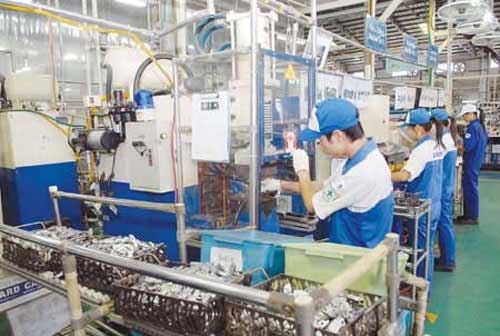
In the first seven months of the year, more than 37,000 enterprises declared bankruptcy or temporarily stopped production, an increase of almost 10 per cent over the same period last year. Does this figure tell you anything about future of Vietnamese enterprises?
 |
This situation reflects the difficulties and challenges that our economy has been facing in the past few years. It is also an indication that the resistance of our economy is weakening.
However, the Viet Nam Association of Small and Medium Enterprises does not think that the figure reflects the real situation of enterprises. I think the number of enterprises facing difficulties is triple the figure quoted.
According to Vietnamese culture and psychology, people think that revealing the closure of their enterprises is a disgrace. That's why I think the real figure of enterprises that have shut down is much, much higher.
As a rule, after years of recession, the world and national economies do start to recover. In the first few months of 2014, Viet Nam recorded US$1.3 billion in export surplus. This is an indication of the warming up of some sectors.
I'm confident the situation will improve in the near future and, hopefully by late 2015, when Viet Nam becomes a signatory to some major trade agreements, big opportunities will present themselves.
What are the major challenges facing Vietnamese enterprises?
In the past few years, Vietnamese enterprises have faced many difficulties selling their products due to the international and national economic downturn. As a result, it led to huge surplus of goods in many enterprises.
In addition, the comparative advantages of our enterprises are much weaker than those of their foreign peers, in terms of access to capital resources, land, administration capacity and others. These factors, coupled by the world economic downturn, have seriously affected the operation of Vietnamese enterprises.
However, in my opinion, our enterprises are facing three major constraints, lack of capital, undeveloped market and lack of competitiveness. For example, if there are two enterprises, one Vietnamese and one foreign, producing similar products, those of the Vietnamese enterprises will lose out to foreign enterprise. This illustrates the need for Vietnamese enterprises to focus more on their competitiveness.
It is said the weakest point of Vietnamese enterprises is their administration capacity. In your opinion what should they do to improve this situation?
I can't agree more! Our administration skills are very, very weak. To improve, businesses must learn from other countries. In addition, they need strong support from the Government in human-resources training and training materials.
I have to concede, until now we don't have separate training materials for different types of administration for different enterprises. However, focusing soley on improving administration is not sufficient. We should also focus on labour productivity as our blue-collar and white collar productivity is much lower than overseas.
Low labour productivity is a factor that weakens an enterprises' comparative advantages. This is one of the key points that should be highlighted during training courses.
What do you think about proposed measures to help enterprises get out of present difficulties?
The measures are too general. I don't think one size fits all. To help enterprises overcome their current difficulties need flexible measures. For example, enterprises need capital resources, they want to have access to capital.
Other businesses that want to expand their markets, should receive support in market information or even market promotion. And, to solve their problems, enterprises themselves should take the initiative to ask authorised agencies for help.
The recent illegal placement of a Chinese oil rig in the East Sea is a good example for us to think about how to diversify our foreign markets, not to put too many eggs in one basket, for example, the Chinese market.
Enterprises also need help from the Government to quickly restore production and to develop. It is undeniable that Vietnamese enterprises are main contributors to the State budget and the most important force in the course of national development.
Meanwhile, enterprises should find measures to lower their production costs and accept less benefits in order to compete with their rivals.
That's not all, in my own opinion, a very important factor that makes the enterprises develop is the human capital. Workers are the solid foundation for sustainable production.